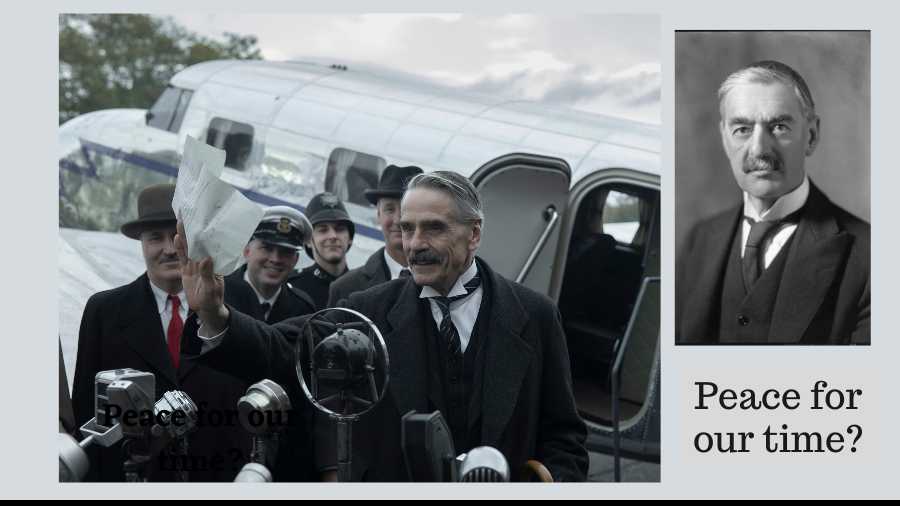This has a whiff of Munich, the Sunday Times headline declared last week, referring to the UK defence secretary’s frustration at some of the ongoing diplomatic attempts to stop Russia from attacking Ukraine. The reference was to the agreement signed in Germany’s third largest city over eight decades ago (September 1938) between the leaders of France, Italy, Germany and the United Kingdom at a time when Europe was on the brink of war. It failed spectacularly though in its avowed objective to prevent World War II _ there was tenuous peace for barely nine months _ with history forever deriding then UK Prime Minister Neville Chamberlain for his guileless efforts and for trusting Hitler to keep his word.
Coincidentally, the events of the fall of 1938 are currently finding representation in popular entertainment, a prescient dissection of power centres desperately working to prevent a full-blown escalation in Europe in the form of the film, Munich-The Edge of War, now streaming on Netflix. Based on Robert Harris’s (Fatherland, The Cicero Trilogy) page-turner succinctly titled Munich, the film is a faithful adaptation of the novel which is a re-evaluation of history as we know it. The events leading up to the signing of the Munich agreement are framed in the context of a few fictional characters who find themselves embedded in serious spycraft, a joint behind-the-scenes effort at preventing yet another war. And in doing so both the film and the book succeed in taking us back in time when the very questions of existence that are confronting the world today were being asked. There were then, as now, men and women of conscience who weren’t afraid to dissent, albeit few, and ask pointedly about nationhood and its responsibilities towards the people who make up a country.
“We don’t choose the times we live in. The only choice we have is how we respond,” Paul von Hartman tells his British civil servant friend from Oxford Hugh Legat, who, in the movie, tries to convince him not to weaponise his principled opposition of Hitler. The two minor functionaries are the key fictional protagonists that bookend this tale that unfolds unhurriedly without losing its sense of urgency even though we know all along how it all ends. The symphonic collage that forms the background score (Isobel Waller-Bridge _ Emma, Fleabag) is unobtrusive, helping to magically foreground the understated universal relevance of the churns within. Two friends who studied together but fell apart for reasons of politics think nothing of coming together decades later when one realises how wrong he was to ignore the innate racism in nationalism-fuelled Nazi Germany. Yet, when Hugh, fearing for Paul’s safety, pleads with him to come to England, he refuses, poignantly articulating his oneness with homeland Germany. Oblivious of the personal imperatives of one of his staff members, a prime minister, who believes in peace, makes it clear he is willing to risk humiliation to try and achieve it through the best possible way he can _ even if the Fuhrer believes nothing in the signed declaration that is a result of diplomatic initiatives. In the black and white contours of history’s unforgiving gaze Chamberlain failed, but director Christian Schwochow (Je Suis Karl, Bad Banks), producer Andrew Eaton (The Crown, Rush) and author Harris believe a generous re-evaluation is in order. And it works. Played by the elegantly affable Jeremy Irons, his Chamberlain has a twinkle in his eyes and embodies an honesty of purpose that propels him to act in good faith.
The film begins with the two friends joined by Lena, Paul’s girlfriend at university, enjoying fireworks and champagne at Oxford. Cut to 1938 and Lena is in bed paralysed, branded for who she is with a Star of David burnt on her back. She is paying the price for joining a demonstration against the Third Reich. Harris’s book begins with Hugh’s thoughts while reading Hitler’s speech, the one he had heard on the radio: “Metallic, remorseless, threatening, self-pitying, boastful _ impressive in a horrible way”. The speech, Hugh notes, had been “punctuated by the thumps of Hitler's hand pounding the podium and by the roar of fifteen thousand voices shouting their approval. The noise was inhuman, unearthly”.
The cheerleaders of that day have their willing counterparts even today. And so, hoping that somehow things will change is futile. “Hoping is waiting for someone else to do it,” Paul cries out to his friend before embarking on his reckless mission. He comes close but freezes when opportunity presents itself, an obtuse reference perhaps to Operation Valkyrie, the failed plot to assassinate Hitler in 1944. Could it then be that the character of Paul von Hartman is loosely based on Adam von Trott who was part of the anti-Hitler resistance in the German foreign office and was later hanged for it? Never mind.
It is just as well Paul is unsuccessful. His inability to pull the trigger, for which he weeps inconsolably, is perhaps a pointer to the way forward. No single bullet aimed at an individual can kill an idea, however perverse in its advocation of annihilation of a people for reasons of race and religion. Only a counter idea of universal humanity and its sincere adoption can outrun evil that still finds expression in various corners of the world. So what Chamberlain failed? He’d try again, he said.
…and fail better. History is waiting. Meanwhile, Russia has announced a partial troop withdrawal from near Ukraine, the move being greeted with characteristic scepticism from the US, prompting a conference of world leaders in, well, Munich.
And every year
The free birds fly
Into the distance
Under auburn skies
Fading to black
The forest sighs
Waiting for spring to
Bring them back










